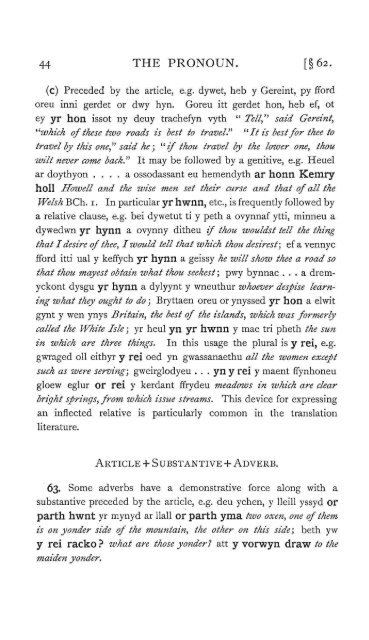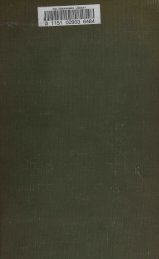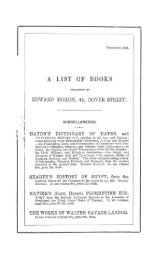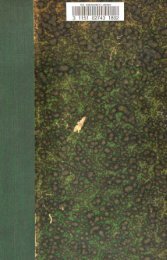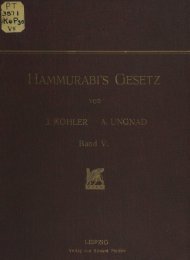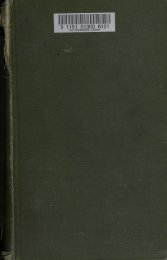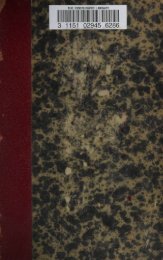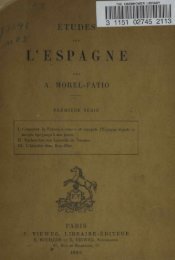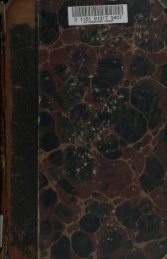- Page 2:
T£ I'^'^l * ^ LIBRARY V OF THE JOH
- Page 6 and 7:
SHEHRATT & HUGHES Publishers to the
- Page 8 and 9:
UNIVERSITY OF MANCHESTER PUBLICATIO
- Page 10 and 11:
vi PREFACE to learn. However, that
- Page 12 and 13:
VIU PREFACE who has also added some
- Page 14 and 15: X PREFACE of the Glossary; and to M
- Page 16 and 17: xii CONTENTS Preyerbal pa:rticles 9
- Page 19 and 20: LIST OF ABBREVIATIONS Anc. Laws. An
- Page 21 and 22: §§i,2.] SOUNDS AND SOUND-CHANGES.
- Page 23 and 24: §3-] SOUNDS AND SOUND-CHANGES. 3 L
- Page 25 and 26: §7-] SOUNDS AND SOUND-CHANGES. 5 C
- Page 27 and 28: §11.] SOUNDS AND SOUND-CHANGES. 7
- Page 29 and 30: § 12.] SOUNDS AND SOUND-CHANGES. 9
- Page 31 and 32: i6.] CONSONANT MUTATIONS. ii Vocali
- Page 33 and 34: § i6.] CONSONANT MUTATIONS. 13 the
- Page 35 and 36: § i6.] CONSONANT MUTATIONS. 15 in
- Page 37 and 38: § 17-] CONSONANT MUTATIONS. 17 vor
- Page 39 and 40: §21.] CONSONANT MUTATIONS. 19 comm
- Page 41 and 42: §24.] THE ARTICLE. THE ARTICLE. 23
- Page 43 and 44: §27.] THE NOUN. 23 be displeased w
- Page 45 and 46: §32.] THE ADJECTIVE. 25 THE ADJECT
- Page 47 and 48: §35-] THE ADJECTIVE. 27 dec a fair
- Page 49 and 50: §40.] THE ADJECTIVE. 29 Constructi
- Page 51 and 52: §42.] THE NUMERALS. 31 xxi.-xcix.
- Page 53 and 54: §46.] THE PRONOUN. 33 etc.) When a
- Page 55 and 56: §49-] THE PRONOUN. 35 arglwyd, heb
- Page 57 and 58: §52.] THE PRONOUN. 37 developed fr
- Page 59 and 60: 53-] THE PRONOUN. 39 Smg. Plur. nem
- Page 61 and 62: §56.] THE PRONOUN. 41 56. They are
- Page 63: §62.] THE PRONOUN. person dy hunan
- Page 67 and 68: §79-] THE PRONOUN. 47 74. peth m.
- Page 69 and 70: §83.] THE PRONOUN. 49 regia caeli,
- Page 71 and 72: §87.] THE PRONOUN. 51 forward by m
- Page 73 and 74: §90.] THE PRONOUN. 53 (b) y gur y
- Page 75 and 76: §93-] THE VERB. 55 Usage of yd. 92
- Page 77 and 78: §96.] THE VERB. 57 94. In later Mi
- Page 79 and 80: §97-] THE VERB 59 he had never see
- Page 81 and 82: § loi.] THE VERB. 6i bur7i): llosg
- Page 83 and 84: § I05.] THE VERB. 63 OccasionaHy i
- Page 85 and 86: § I07.] THE VERB. 65 WB. p. 217; y
- Page 87 and 88: § I09.] THE VERB. 67 first onset h
- Page 89 and 90: §111.] THE VERB. 69 of the subjunc
- Page 91 and 92: § II4-] THE VERB. 71 spare the bod
- Page 93 and 94: 1I4-] THE VERB. 73 take thee as lon
- Page 95 and 96: § 117.] THE VERB. 75 The Imperativ
- Page 97 and 98: I20.] THE VERB. 77 (S) -at, -et, -u
- Page 99 and 100: § 126.] THE VERB. 79 oruc y uorwyn
- Page 101 and 102: 127.] THE VERB. PARADIGM OF THE REG
- Page 103 and 104: § 129.] THE VERB. 83 no vowel but
- Page 105 and 106: I33-] THE VERB. 85 Preterite and Pe
- Page 107 and 108: § 136.] THE VERB. 87 (e) --wyt, li
- Page 109 and 110: § 140.] IRREGULAR VERBS. 89 IMPERF
- Page 111 and 112: (b) (c) 141.] IRREGULAR VERBS. 91 I
- Page 113 and 114: § I43-] IRREGULAR VERBS. 93 sing.
- Page 115 and 116:
144-] IRREGULAR VERBS. 95 PAST. sin
- Page 117 and 118:
§ 151.] IRREGULAR VERBS. 97 146. r
- Page 119 and 120:
§ 152.] THE SUBSTANTIVE VERB. 99 J
- Page 121 and 122:
§ I54-] THE SUBSTANTIVE VERB. loi
- Page 123 and 124:
§ 156.] THE COPULA. 103 (5) nyt is
- Page 125 and 126:
159-J THE COPULA. 105 POSITION OF T
- Page 127 and 128:
§i6i.] COMPOUNDS OF BOT. 107 PRETE
- Page 129 and 130:
§ i65.] THE PREPOSITION. 109 164.
- Page 131 and 132:
§172.] THE PREPOSITION. in which t
- Page 133 and 134:
§ i83.] THE PREPOSITION. 113 the d
- Page 135 and 136:
§190.] THE PREPOSITION. 115 ears o
- Page 137 and 138:
§196.] THE PREPOSITION. 117 dynu a
- Page 139 and 140:
§199-] THE CONJUNCTION. 119 y geis
- Page 141 and 142:
§207.] THE CONJUNCTION. 121 C3m bw
- Page 143 and 144:
§2i6.] THE CONJUNCTION. 123 thus e
- Page 145 and 146:
§222.] THE CONJUNCTION. 125 219. n
- Page 147 and 148:
§226.] THE CONJUNCTION. 127 dim a
- Page 149 and 150:
§230.] THE CONJUNCTION. 129 common
- Page 151 and 152:
§236. NEGATIVE PARTICLES. 131 -vyd
- Page 153 and 154:
§239-] INTERROGATIVE PARTICLES. 13
- Page 155 and 156:
§243.] THE INTERJECTION. 135 242.
- Page 157:
A Middle-Welsh Reader
- Page 160 and 161:
140 LEAR AND HIS DAUGHTERS 4. Ac yn
- Page 162 and 163:
142 LEAR AND HIS DAUGHTERS 8. A gGe
- Page 164 and 165:
144 LEAR AND HIS DAUGHTERS y gynuHa
- Page 166 and 167:
146 THE STORY OF ARTHUR py diG bynh
- Page 168 and 169:
148 THE STORY OF ARTHUR ymgyghor ac
- Page 170 and 171:
150 THE STORY OF ARTHUR a gadGaf ff
- Page 172 and 173:
152 THE STORY OF ARTHUR ef a erchis
- Page 174 and 175:
154 THE STORY OF ARTHUR 13. A gGedy
- Page 176 and 177:
156 THE STORY OF ARTHUR A gGedy dec
- Page 178 and 179:
158 THE STORY OF ARTHUR ny aHGys gG
- Page 180 and 181:
i6o THE STORY OF ARTHUR He y deuth
- Page 182 and 183:
i62 THE STORY OF ARTHUR hynny HaGer
- Page 184 and 185:
i64 THE STORY OF ARTHUR gGyrda y gy
- Page 186 and 187:
i66 THE STORY OF ARTHUR ydGyf gan g
- Page 188 and 189:
i68 THE STORY OF ARTHUR wyr Rufein
- Page 190 and 191:
170 THE STORY OF ARTHUR geffych ti
- Page 192 and 193:
172 THE STORY OF ARTHUR eHygGys ken
- Page 194 and 195:
174 THE STORY OF ARTHUR ar amheraGd
- Page 196 and 197:
176 THE STORY OF ARTHUR a dyGedut G
- Page 198 and 199:
178 THE STORY OF ARTHUR iarH KernyG
- Page 200 and 201:
i8o THE STORY OF ARTHUR chwe gGyr a
- Page 202 and 203:
i82 THE STORY OF ARTHUR o tebygu an
- Page 204 and 205:
i84 THE STORY OF ARTHUR plith y wyr
- Page 206 and 207:
i86 THE STORY OF ARTHUR blodeuaG de
- Page 208 and 209:
i88 THE STORY OF ARTHUR ar kestyH a
- Page 210 and 211:
I90 THE STORY OF ARTHUR onadunt yn
- Page 212 and 213:
192 THE STORY OF ARTHUR hGnnG, Arth
- Page 214 and 215:
194 THE HUNTING OF TWRCH TRWYTH 3.
- Page 216 and 217:
196 THE HUNTING OF TWRCH TRWYTH kar
- Page 218 and 219:
198 THE HUNTING OF TWRCH TRWYTH ef
- Page 220 and 221:
200 THE HUNTING OF TWRCH TRWYTH vyG
- Page 222 and 223:
202 THE HUNTING OF TWRCH TRWYTH ede
- Page 224 and 225:
204 THE HUNTING OF TWRCH TRWYTH TOr
- Page 226 and 227:
2o6 THE HUNTING OF TWRCH TRWYTH Ac
- Page 228 and 229:
208 IV. THE PROCEDURE IN A SUIT FOR
- Page 230 and 231:
2IO A SUIT FOR LANDED PROPERTY dehe
- Page 232 and 233:
212 A SUIT FOR LANDED PROPERTY ena
- Page 234 and 235:
214 A SUIT FOR LANDED PROPERTY Ninn
- Page 236 and 237:
2i6 A SUIT FOR LANDED PROPERTY ager
- Page 238 and 239:
2x8 A SUIT FOR LANDED PROPERTY y eu
- Page 240 and 241:
220 A SUIT FOR LANDED PROPERTY esau
- Page 242 and 243:
222 V. THE PRIVILEGE OF ST. TEILIO.
- Page 244 and 245:
224 THE PRIVILEGE OF ST. TEILIO cyf
- Page 246 and 247:
226 MORAL VERSES Kalan gaeaf, cui k
- Page 248 and 249:
228 DOOMSDAY Pan discynho Pater Y d
- Page 250 and 251:
230 DOOMSDAY Ac ym oed y ereu, Ac y
- Page 252 and 253:
232 DOOMSDAY Kayator y dyleith Arna
- Page 254 and 255:
234 IX. CYNDDELW TO RHYS AB GRUFFUD
- Page 256 and 257:
236 CYNDDELW TO RHYS AB GRUFFUDD As
- Page 258 and 259:
238 A RELIGIOUS POEM An duch ir gul
- Page 260 and 261:
240 A DIALOGUE "Dabre genhiw im tin
- Page 262 and 263:
242 WINTER Ottid eiry, tohid istrad
- Page 265 and 266:
GLOSSARY The paragraphs refer to th
- Page 267 and 268:
annerch to greet, address ; pi. -eu
- Page 269 and 270:
Temia.-wl privileged. 219, 14. brei
- Page 271 and 272:
cefyn (keuen) back; pl.cefneu; dang
- Page 273 and 274:
cyflafan f. an out?uge, slaughter.
- Page 275 and 276:
daffar provision. 225, 19 ; cf. gwn
- Page 277 and 278:
dodi (dody) to place, put, give, ch
- Page 279 and 280:
eiry snow. Eirya-wn n. pr. m. 204,
- Page 281 and 282:
glew-'der bravery, boldness, valour
- Page 283 and 284:
g^astadawl constant. 169, 4. v.l. (
- Page 285 and 286:
han-b-wylla-w to consider, remember
- Page 287 and 288:
Uetty-wr m. a host. 195, 9. Lieu n.
- Page 289 and 290:
nul-wr m. a warrior. mUvTryaeth f.
- Page 291 and 292:
pared m. a wall,partition. 196, 20.
- Page 293 and 294:
e-winyaw to cause to perish, destro
- Page 295 and 296:
1. ten thine. § 55. 2. teu silent?
- Page 297 and 298:
ychydig some, a little, a few. y-da
- Page 299 and 300:
APPENDIX Additional 'Variants to "
- Page 301:
Index
- Page 304 and 305:
284 INDEX. caffael, cael, paradigm
- Page 306 and 307:
286 INDEX. hwde, 149. hwnn, etc. de
- Page 308 and 309:
288 INDEX. negative particles, 235-
- Page 310 and 311:
290 INDEX. etc. 45; mivi etc. 45; m
- Page 312 and 313:
292 INDEX. agent with, 122; with gw
- Page 314 and 315:
294 CORRIGENDA P. 210'', 1. i„for
- Page 317 and 318:
SHERRATT & HUGHES MANCHESTER UNIVER
- Page 319 and 320:
SHERRATT & HUGHES MANCHESTER UNIVER
- Page 321 and 322:
SHERRATT & HUGHES MANCHESTER UNIVER
- Page 323 and 324:
SHERRATT & HUGHES MANCHESTER UNIVER
- Page 325 and 326:
SHERRATT & HUGHES MANCHESTER UNIVER
- Page 327 and 328:
SHERRATT & HUGHES MANCHESTER UNIVER
- Page 329 and 330:
SHERRATT & HUGHES MANCHESTER UNIVER
- Page 331 and 332:
SHERRATT & HUGHES MANCHESTER UNIVER
- Page 334:
151 00248 1772


